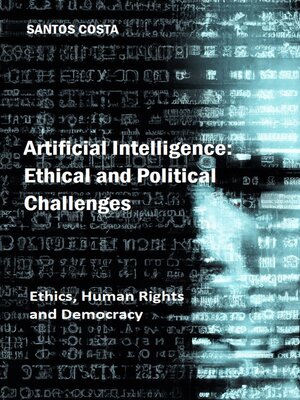
Sign up to save your library
With an OverDrive account, you can save your favorite libraries for at-a-glance information about availability. Find out more about OverDrive accounts.
Find this title in Libby, the library reading app by OverDrive.



Search for a digital library with this title
Title found at these libraries:
| Library Name | Distance |
|---|---|
| Loading... |
"Artificial Intelligence: Ethical and Political Challenges" is a work that comprehensively addresses the ethical and political implications of implementing Artificial Intelligence (AI) in contemporary society. Consisting of five chapters, the book explores the main themes related to AI, from its introduction and uses in society to the public policies needed to regulate its use and protect human rights.
In the first chapter, the book offers a comprehensive introduction to AI, presenting its definitions and discussing its uses and applications in society. It explores how AI is transforming diverse sectors, from industry to healthcare, and highlights the need to understand the ethical and political challenges that arise with this technology.
In the second chapter, the book dives into the ethical issues related to AI, discussing the moral dilemmas faced in the development and use of this technology. Topics such as privacy, algorithmic bias, automated decision-making, and accountability of AI systems are explored. The chapter provokes reflections on how to balance the benefits of AI with the ethical values and interests of the parties involved.
The third chapter looks at the impact of AI on human rights and democracy. It explores how massive data collection, mass surveillance, and the use of algorithms can affect privacy, freedom of expression, and other fundamental rights. It discusses the challenges faced in protecting these rights in the age of AI, and presents solutions and approaches to ensure an ethical implementation of this technology.
In the fourth chapter, the book addresses the need for public policies to regulate AI and protect human rights. It explores how different countries and international organizations have adopted approaches to dealing with AI regulation, considering the balance between promoting innovation and protecting rights. Examples of existing legislation, guidelines and initiatives aimed at ensuring an ethical and safe environment for the use of AI are discussed.
In the fifth and final chapter, the importance of accountability and transparency in the implementation of AI is highlighted. Accountability mechanisms, such as the explainability of algorithms and the auditing of AI systems, are explored to ensure the reliability and accountability of AI systems. In addition, the creation of ethical and technical standards to guide the development and responsible use of AI is discussed.
"Artificial Intelligence: Ethical and Political Challenges" offers a comprehensive overview of the ethical and political challenges and dilemmas related to AI. It is essential reading for academics, practitioners, policymakers, and anyone interested in understanding the impact of AI on contemporary society and finding solutions to its ethical and political challenges.







